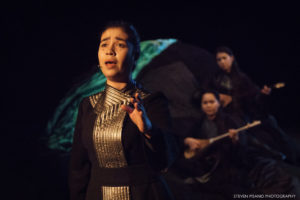For most Western audiences, oral epic poetry seems like something out of the far distant past: a tradition from the time of the ancient Greeks that was once great, but is now largely forgotten. However, in Central Asia, one of the world’s great centers for this type of art form, the performance of oral epic poetry remains a living tradition. While the bards who recited the Greek stories of the Iliad and the Odyssey disappeared thousands of years ago, Central Asian bards have kept the epic tradition alive through the centuries. Epic performances remain an important way not only to entertain, but also to pass on moral values and important information about the history and social identity of particular clans, tribes, and people.
The most recent proof that the epic tradition is alive and well in Central Asia comes in the form of a bold new multimedia performance piece created by Uzbek filmmaker and director Saodat Ismailova that brings one of Central Asia’s most famous ancient epics firmly into the 21st century. Read on to learn more about this innovative and important work, which recently completed an acclaimed US tour.
The Story of the Qyrq Qyz

Saodat Ismailova’s new work is a retelling of Qyrq Qyz, which translates as “Forty Girls” or “Forty Maidens.” A vital centerpiece of Central Asian storytelling, Qyrq Qyz weaves together elements of myth, legend, history, and geography. However, it is distinct from most other epics when it comes to gender. Intriguingly, Qyrq Qyz is a powerful matriarchal narrative that celebrates women’s strength and power, as well as the upending of conventional gender norms in patriarchal societies.
At the heart of Qyrq Qyz is the heroine Gulayim, the 16-year-old daughter of the ruler of the semi-nomadic Karakalpak people (today, Karakalpakstan is a semi-autonomous region in northwestern Uzbekistan). When an enemy force invades her father’s fortress, kills him, and takes many of her people captive, Gulayim calls on her “forty girls”—female companions whom Gulayim herself has trained in the art of war—to help her right this wrong. Gulayim and her warriors vanquish the invaders, liberate their captives,d and go on to build a diverse but united society based on peace and compassion.
The Qyrq Qyz in the 21st Century
Like other epics, Qyrq Qyz was passed down orally from one generation to the next. According to Dartmouth College ethnomusicologist Theodore Levin, the last person to recite Qyrq Qyz, having received the epic through an unbroken chain of oral transmission, died in 2004. Now, Saodat Ismailova’s new work is effectively rebooting the link to the oral traditions of the past by training a new generation of “bards” to transmit the epic in a decidedly 21st century form.
Ismailova’s interpretation of Qyrq Qyz brings together film and live music to create an evocative experience. The film component offers dreamy, atmospheric re-enactments of Gulayim’s story, shot in the bare and windswept landscape of Karakalpakstan and featuring non-professional actors. The on-screen action is accompanied on-stage by eight female musicians from Kazakhstan, Kyrgyzstan, and Uzbekistan. The young bards play traditional Central Asian instruments—including the temir komuz, a type of metal jaw harp; the qobyz, a two-stringed fiddle; and the doira, a frame drum—and sing and recite stanzas from the Qyrq Qyz epic. All the musicians have received special tutoring in their respective disciplines from master musicians under the umbrella of the Aga Khan Music Initiative, a program that aims to preserve, transmit, and further develop the musical heritage of countries with a strong Muslim presence.
The fruit of this incredible collaboration is a work that strives to share and explore the distinctive culture of a region that is not well-known on the international stage, while at the same time acknowledging that this culture is constantly evolving. The performers and artists working on the production have also found the process to be a rich opportunity for cultural exchange.
About the Artistic Director
Saodat Ismailova is part of a new generation of Central Asian artists who have established outward-looking artistic lives in the post-Soviet era while drawing significant creative inspiration from a deep engagement with their native regions. As one of this generation’s most accomplished and internationally recognized representatives, Ismailova has seen her films screened at prestigious festivals around the world. Her debut feature film, 40 Days of Silence, which explores the lives of four generations of Tajik women living without men, received a nomination for best debut film at the 2014 Berlin International Film Festival, while her documentary film Aral: Fishing in an Invisible Sea won the best documentary award at the 2004 Turin Film Festival. She also created numerous video installations, as well as nine music documentaries co-produced by the Aga Khan Music Initiative. Ismailova currently resides in Tashkent and Paris.
